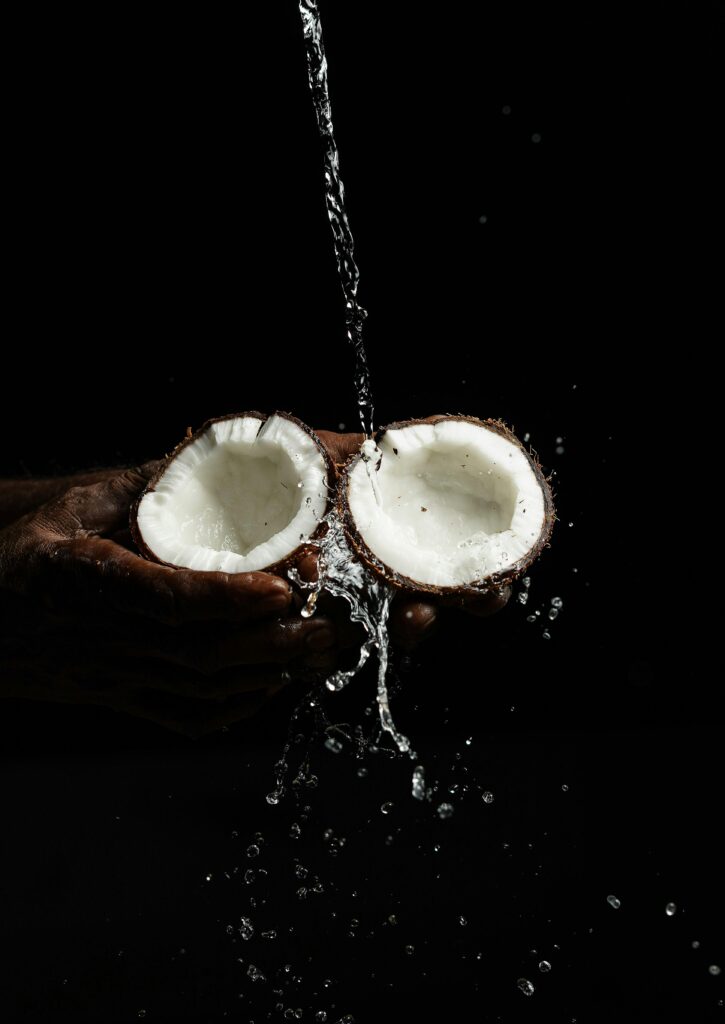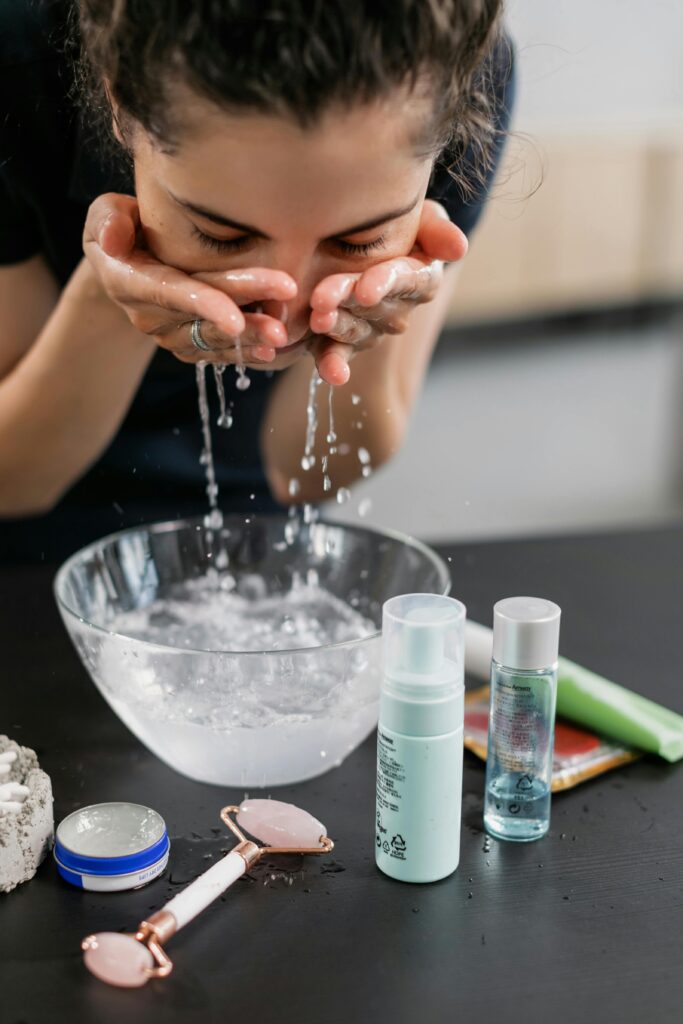Coconut water has been hailed as a super-hydrating drink, offering numerous health benefits when consumed. However, its use extends beyond just a refreshing beverage—it’s also becoming increasingly popular in skincare routines. Thanks to its natural properties, coconut water is often promoted as a miracle product for skin health. But does it truly live up to the hype?In this article, we’ll explore the benefits and risks of using coconut water on your skin, helping you determine whether it’s worth adding to your skincare regimen.

What Is Coconut Water?
Coconut water is the clear liquid found inside young, green coconuts, distinct from the thick, creamy coconut milk made from the grated meat of mature coconuts. This refreshing liquid is naturally low in calories, rich in electrolytes, and packed with minerals such as potassium, sodium, and magnesium. Its hydrating properties are the main reason why people consume it, but its uses aren’t limited to just drinking. Coconut water is also used in numerous cosmetic and skincare products because of its potential benefits for the skin.
The Benefits of Using Coconut Water on Your Skin
1. Hydration
Coconut water is renowned for its hydrating properties, not just when consumed but also when applied topically. It contains natural electrolytes like potassium and sodium that help replenish moisture in the skin. When used as a toner or face mask, coconut water can help restore your skin’s natural moisture balance, keeping it soft and hydrated. It’s an excellent option for individuals with dry skin or those living in harsh climates where the skin is prone to dehydration.
2. Rich in Nutrients
Coconut water is a natural source of antioxidants and essential minerals that support healthy skin. It contains vitamins like vitamin C, which is known for its brightening and anti-aging effects, and B-vitamins that help maintain the skin’s health and resilience. These nutrients can help reduce the appearance of fine lines, promote skin elasticity, and even out skin tone.
3. Anti-Inflammatory Properties
Coconut water has anti-inflammatory properties that can soothe irritated or inflamed skin. If you suffer from conditions like acne, eczema, or psoriasis, applying coconut water to the affected area may help reduce redness and swelling. The antioxidants in coconut water also play a role in calming inflamed skin, which is beneficial for those with sensitive skin.
4. Natural Acne Treatment
Acne is one of the most common skin conditions that coconut water is said to help with. Its antibacterial and anti-inflammatory properties may help reduce the redness, swelling, and potential scarring associated with acne. Coconut water can be applied directly to acne-prone areas to help clear clogged pores and combat the bacteria responsible for breakouts. Additionally, its mild exfoliating action can aid in removing dead skin cells, which further helps in preventing clogged pores.
5. Promotes Skin Healing
Coconut water contains cytokinins, plant hormones that have been shown to promote cell growth and repair. When applied topically, coconut water may help accelerate the healing process for wounds, cuts, or minor skin abrasions. Its antimicrobial properties can also help prevent infection in damaged skin, promoting faster and more effective healing.
6. Anti-Aging Effects
Coconut water is often touted for its potential anti-aging effects due to its high concentration of antioxidants. These compounds can help protect the skin from free radicals that contribute to premature aging, such as wrinkles, sagging, and fine lines. By incorporating coconut water into your skincare routine, you might be able to preserve your skin’s youthful appearance and improve skin elasticity.

How to Use Coconut Water on Your Skin
There are several ways to incorporate coconut water into your skincare routine:
- Cleansing: Coconut water can be used as a natural cleanser. Simply dip a cotton ball into coconut water and gently apply it to your face to remove dirt, oil, and makeup. It’s a mild, non-drying alternative to harsh chemical cleansers.
- Toning: Use coconut water as a toner after cleansing your face. This will help tighten pores, balance your skin’s pH, and hydrate the skin. You can apply it using a cotton pad or spray it directly onto your face.
- Face Mask: You can make your own DIY face mask by combining coconut water with ingredients like honey, yogurt, or turmeric. These masks can offer hydration, anti-inflammatory effects, and a glowing complexion.
- Spot Treatment: For acne, apply coconut water directly to blemishes using a cotton swab. The antibacterial and anti-inflammatory properties may help reduce the size and redness of pimples.
- Body Lotion: Coconut water can be used on the body to hydrate dry skin. After a shower, gently massage coconut water into the skin for an instant moisturizing boost.
The Risks of Using Coconut Water on Your Skin
While coconut water offers numerous benefits, it may not be suitable for everyone.Here are a few potential risks to consider:
1. Allergic Reactions
Although rare, some people may be allergic to coconut water. If you have a known allergy to coconuts or other tree nuts, you should avoid using coconut water on your skin. Allergic reactions can range from mild irritation and redness to more severe symptoms like swelling and rashes. It’s recommended to do a patch test on a small area of your skin before applying coconut water to larger areas.
2. Clogging Pores
Coconut water is a liquid, but it still contains some oils and sugars that may not be suitable for everyone’s skin. If you have oily or acne-prone skin, using coconut water could contribute to clogged pores, potentially leading to more breakouts. While coconut water can help acne in some cases, it may exacerbate the condition in others.
3. Not a Substitute for Proper Skin Care
While coconut water is beneficial for skin health, it should not be considered a miracle product that can replace your entire skincare routine. For instance, coconut water does not provide sun protection, so you should still use sunscreen to shield your skin from UV rays. Additionally, those with more severe skin conditions may need specialized treatments beyond what coconut water can offer.
4. Overuse and Imbalance
Coconut water is highly hydrating, but overuse can potentially disrupt the balance of your skin. Applying it too frequently or in large amounts could lead to overly hydrated skin, making it more prone to irritation or sensitivity. Using it in moderation is essential for achieving the best results.
Conclusion
Coconut water is a promising natural ingredient that offers a variety of skin benefits, including hydration, anti-inflammatory effects, and potential acne-fighting properties. Its gentle nature makes it suitable for many skin types, particularly those with dry or sensitive skin. However, as with any skincare product, it’s important to consider your individual skin needs and perform a patch test to ensure it’s safe for you.
For the best results, use coconut water as part of a balanced skincare routine that includes proper cleansing, moisturizing, and sun protection. While coconut water is not a miracle cure for all skin issues, it can certainly complement your skincare regimen and promote healthier, more radiant skin when used appropriately.
